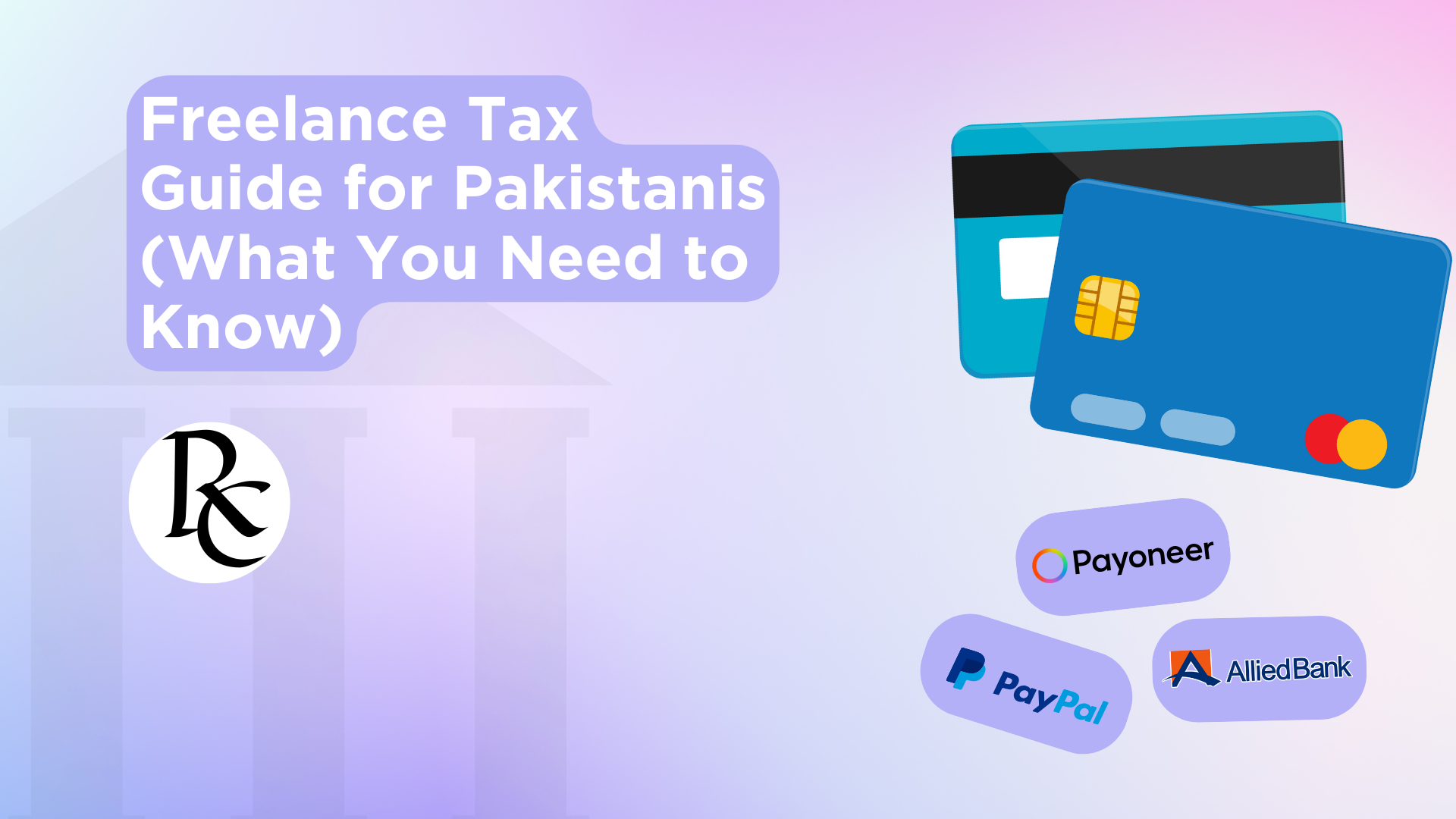Understanding Freelance Tax Guide in Pakistan
Whether you work on Fiverr, Upwork, or independently with international clients, understanding Freelance Tax Guide is a critical part of freelancing in Pakistan. As the industry grows, the Federal Board of Revenue (FBR) is paying closer attention to online incomes. This guide explains what freelancers need to know about tax registration, income declaration, and how to stay compliant in 2025.
Who Is Considered a Freelancer?
According to the FBR, a freelancer is anyone who offers services online and earns income through platforms, clients, or remote work. This includes designers, writers, developers, marketers, editors, virtual assistants, and consultants. If you’re earning from abroad and receiving money in Pakistan, you’re expected to declare that income—even if it’s from Payoneer, Wise, or a bank wire transfer.
Do Freelancers in Pakistan Have to Pay Tax?
Yes. If your yearly income exceeds the taxable threshold, you are legally required to register and file an income tax return, even if all your clients are abroad. Freelancers fall under the category of “non-salaried individuals” in the tax system.
- Annual tax-free income threshold (2025): PKR 600,000
- Beyond this, you must pay progressive income tax rates
- International remittance exemption rules may apply if sent via proper channels
Step-by-Step: How to Register as a Freelancer with FBR
- Visit FBR IRIS portal
- Create a new account using your CNIC and mobile number
- Receive your NTN (National Tax Number) upon registration
- Login and complete the “Registration Form” under the Non-Salaried Individual category
- Add your professional services (e.g. graphic design, software development, etc.)
- Submit your bank account and business address information
Filing Taxes as a Freelancer
You must file an annual income tax return using the IRIS system. Declare your total income (converted to PKR), and attach any relevant bank statements or foreign income proofs if needed.
- File by the deadline (usually September 30 each year)
- Declare total freelance income from platforms or direct clients
- Upload documentation if requested for verification
- You may not owe any tax if your income was sent as remittance through proper channels (like Payoneer/Wise to your Pakistani bank)
What About Tax Exemptions for Freelancers?
Good news: income remitted to Pakistan from abroad via official banking channels (e.g. Payoneer, Wise, or SWIFT transfer) is often exempt from income tax under section 111(4) of the Income Tax Ordinance. However, it must meet these conditions:
- Funds must come from a foreign source
- Transferred through a registered Pakistani bank
- Proper documentation must be available
This exemption applies only to income remitted—not locally earned income. Also, this doesn’t exempt you from filing your tax return. You still need to file annually to maintain your “filer” status.
Benefits of Becoming a Tax Filer
Even if you owe zero tax, filing your return brings several benefits:
- Lower tax on vehicle registration and property purchases
- Better access to loans and bank credit cards
- Official recognition as a compliant taxpayer
- Prevention from future legal notices and penalties
Do I Need a Business or Company to File Tax?
No. Freelancers can file under their personal name using the “non-salaried individual” category. However, if your income grows significantly or you plan to register for sales tax or offer digital services to local clients, you may consider registering a sole proprietorship or small business.
Tools for Tracking Your Freelance Income
Keeping accurate records is essential. Here are tools that help you track income and make tax filing easier:
- Google Sheets or Excel: For monthly income tracking
- Wave Accounting: Free accounting software for freelancers
- QuickBooks: Paid, professional invoicing and reporting
- Payoneer/Wise Reports: Downloadable statements showing income received
Common Mistakes Freelancers Make (and How to Avoid Them)
- Not filing taxes at all assuming it doesn’t apply to freelancers
- Using personal bank accounts without documentation
- Mixing local income and foreign remittance without separation
- Waiting too long and missing deadlines
The key to avoiding penalties is to stay organized, track every payment, and file honestly—even if your taxable amount is zero.
Legal Proof of Income for Freelancers
If you ever need to show proof of income—for visa applications, loan approvals, or property investments—your filed tax returns are considered official documents. Filing consistently gives you financial credibility both in Pakistan and abroad.
Summary: What to Remember
- Register on the FBR IRIS portal and get your NTN
- File your return every year—even if your income is tax-exempt
- Remittances sent through official channels may be tax-free under Section 111(4)
- Maintain clear income records and bank statements
- Use digital tools to simplify reporting and tracking
Frequently Asked Questions
Do freelancers in Pakistan have to pay tax?
Yes. If your income exceeds the tax-free limit, you must register and file a tax return. However, foreign income may be exempt under certain conditions.
Is freelance income remitted via Payoneer taxable?
If sent through official banking channels and documented properly, it may be exempt under Section 111(4) of the Income Tax Ordinance.
How do I file freelance taxes in Pakistan?
Register on the FBR IRIS portal, declare your annual income, and file a return under the non-salaried individual category.
Do I need a company or business name to file?
No, freelancers can file under their own name without needing a registered business.
What documents do freelancers need to keep for taxes?
Maintain income records, bank statements, Payoneer/Wise reports, and any invoices or contracts you’ve issued.





Hello there I am so thrilled I found your weblog, I really found you by mistake, while I was researching on Aol for something else, Regardless I am here now and would just like to say many thanks for a fantastic post and a all round interesting blog (I also love the theme/design), I don’t have time to go through it all at the moment but I have book-marked it and also added your RSS feeds, so when I have time I will be back to read a lot more, Please do keep up the superb work.
I applied for google adsans to feed me whatever I was doing,, after rejecting I had to stop 🙁